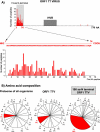Recognition of conserved amino acid motifs of common viruses and its role in autoimmunity
- PMID: 16362076
- PMCID: PMC1315278
- DOI: 10.1371/journal.ppat.0010041
Recognition of conserved amino acid motifs of common viruses and its role in autoimmunity
Abstract
The triggers of autoimmune diseases such as multiple sclerosis (MS) remain elusive. Epidemiological studies suggest that common pathogens can exacerbate and also induce MS, but it has been difficult to pinpoint individual organisms. Here we demonstrate that in vivo clonally expanded CD4+ T cells isolated from the cerebrospinal fluid of a MS patient during disease exacerbation respond to a poly-arginine motif of the nonpathogenic and ubiquitous Torque Teno virus. These T cell clones also can be stimulated by arginine-enriched protein domains from other common viruses and recognize multiple autoantigens. Our data suggest that repeated infections with common pathogenic and even nonpathogenic viruses could expand T cells specific for conserved protein domains that are able to cross-react with tissue-derived and ubiquitous autoantigens.
Conflict of interest statement
Figures





References
-
- Fujinami RS, Oldstone MB. Amino acid homology between the encephalitogenic site of myelin basic protein and virus: Mechanism for autoimmunity. Science. 1985;230:1043–1045. - PubMed
Publication types
MeSH terms
Substances
Associated data
- Actions
- Actions
- Actions
- Actions
- Actions
- Actions
- Actions
LinkOut - more resources
Full Text Sources
Other Literature Sources
Molecular Biology Databases
Research Materials

